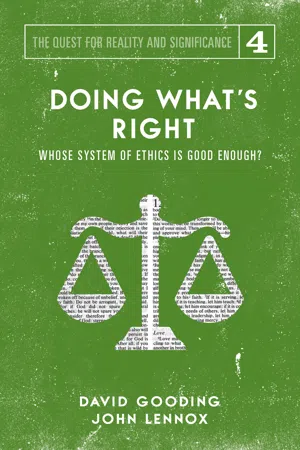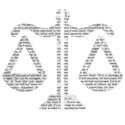
eBook - ePub
Doing What's Right
The Limits of Our Worth, Power, Freedom and Destiny
This is a test
- English
- ePUB (mobile friendly)
- Available on iOS & Android
eBook - ePub
Doing What's Right
The Limits of Our Worth, Power, Freedom and Destiny
Book details
Book preview
Table of contents
Citations
About This Book
In Book 4 – Doing What's Right, Gooding and Lennox present particular ethical theories that claim to hold the basic principles everyone should follow. They compare the insights and potential weaknesses of each system by asking: what is its authority, its supreme goal, its specific rules, and its guidance for daily life? They then evaluate why even the best theories have proven to be impossible to follow consistently.
Frequently asked questions
At the moment all of our mobile-responsive ePub books are available to download via the app. Most of our PDFs are also available to download and we're working on making the final remaining ones downloadable now. Learn more here.
Both plans give you full access to the library and all of Perlego’s features. The only differences are the price and subscription period: With the annual plan you’ll save around 30% compared to 12 months on the monthly plan.
We are an online textbook subscription service, where you can get access to an entire online library for less than the price of a single book per month. With over 1 million books across 1000+ topics, we’ve got you covered! Learn more here.
Look out for the read-aloud symbol on your next book to see if you can listen to it. The read-aloud tool reads text aloud for you, highlighting the text as it is being read. You can pause it, speed it up and slow it down. Learn more here.
Yes, you can access Doing What's Right by David W. Gooding, John C. Lennox in PDF and/or ePUB format, as well as other popular books in Philosophy & Ethics & Moral Philosophy. We have over one million books available in our catalogue for you to explore.
Information
Topic
PhilosophySubtopic
Ethics & Moral PhilosophyChapter 1Questions for Ethical Theories
In times past, ethics was naturally faced with the age-old problems of sexual morality, war, racism, poverty and capital punishment. But nowadays, new technological advances are raising additional huge and difficult fundamental issues . . . just at the time when multitudes of people have lost (if they ever had) even the remnants of a religious belief to underpin and guide their ethical values and decisions.

Introduction
There is no doubt that for many people the world has become an ethically uncertain and bewildering place. Strong communitarian ideologies, with belief-systems and practices enforced from the centre, have faded, leaving millions of people around the world with no settled source from which to derive their ethical beliefs, their long-term values and guidance for their moral behaviour in private, social, commercial and political life.
At the other extreme, western liberalism is not without its severe critics. Since the days of its famous philosophical advocate, John Stuart Mill (1806–73), it has certainly led to great individual freedom and to prosperous economies (though it is differently interpreted in different countries). But starting with the ‘negative rights’ of individuals to be left free, as much as possible, from interference by others (and in particular by legal authorities) in matters of conscience, lifestyle, tastes, inclinations, commerce, property, etc., it has developed a demand for ‘positive rights’ to a variety of sophisticated goods, without a balancing recognition of the duties that are entailed by rights, and with a consequent reluctance to affirm any substantive moral values. Professor Brenda Almond, herself a liberal, writes:
Contemporary criticism of liberalism, whether from the left or right, arises from a fundamental malaise occasioned by a general decline in the conditions of life in modern liberal societies—the rootlessness of the privatized individual in a mass society, crime, pornography and the decline of the family—in sum the moral and cultural vacuum to which some versions of pluralistic liberalism appear to lead . . . Many of the ills of liberal societies stem from the decline of the family and the breakdown of the contractual elements in human relationships . . . it has in effect become in a modern state, impossible to marry—if by that one means to make a long-term (or even fixed term!) commitment binding on both parties. And states have removed ultimate responsibility for offspring, too, by well-intentioned but ill-advised measures of support for unsupported families.1
Modern difficulties for ethical theory
In times past, ethics was naturally faced with the age-old problems of sexual morality, war, racism, poverty and capital punishment. But nowadays, new technological advances are raising additional huge and difficult fundamental issues related to genetic engineering, stem-cell research, embryonic implants, the cloning of human beings, customized babies, etc. just at the time when multitudes of people have lost (if they ever had) even the remnants of a religious belief to underpin and guide their ethical values and decisions.
In addition, many are succumbing to philosophical and scientific theories which teach that in each person there is no unified, continuing self that can maintain a consistent, principled stance towards life but only a kaleidoscopic succession of immediate impressions and reactions. And on this assumption the difficulty of developing stable, character-forming beliefs is aggravated by two further difficulties.
The first is one of the by-products of the astonishing development of information technology. Its benefits need not be rehearsed; but they have a downside. Through the Internet, people’s minds are flooded with information from all over the world on every conceivable topic. The result is that many find it difficult to analyse the comparative worth of all the information, facts, views, theories, philosophies and religions with which they are presented. Moreover, undigested information is not true knowledge, and unanalysed knowledge is not necessarily understanding. As a result, forming a well and rationally thought out morality and worldview becomes not easier but harder.
The second difficulty in developing stable ethical belief is postmodernism’s pluralism, which teaches people to think that in all this massive information there is no objective truth anywhere. One interpretation is no more right or wrong than any other. All our understanding is culturally determined. We therefore cannot hope truly to interpret past cultures, or even present cultures other than our own; and since our own culture may well think differently in the future from what it thinks now, what is the point of trying to develop any permanent ethical principles?
Table of contents
- The Quest for Reality and Significance
- Illustrations
- Series Preface
- Analytical Outline
- Doing What’s Right
- Series Introduction
- The Status, Basis and Authority of Ethics
- 1. How We Perceive the World
- 2. What Should We do, and Why?
- 3. The Source of Objective Moral Values
- Major Contemporary Ethical Systems
- 4. Christian Ethics
- 5. Act Utilitarianism
- 6. Intuitionism
- 7. Kantian Ethics
- 8. Virtue Ethics
- 9. Egoism
- What Use Is Ethics?
- 10. Determining the Value of a Human Being
- 11. The Ethics of the Transmission of Life
- 12. Ethical Issues Raised by Science and Technology
- 13. Exercises in Ethics
- 14. Beyond Ethics
- Appendix: The Scientific Endeavour
- Series Bibliography
- Study Questions for Teachers and Students
- Scripture Index
- General Index
- About the Authors
